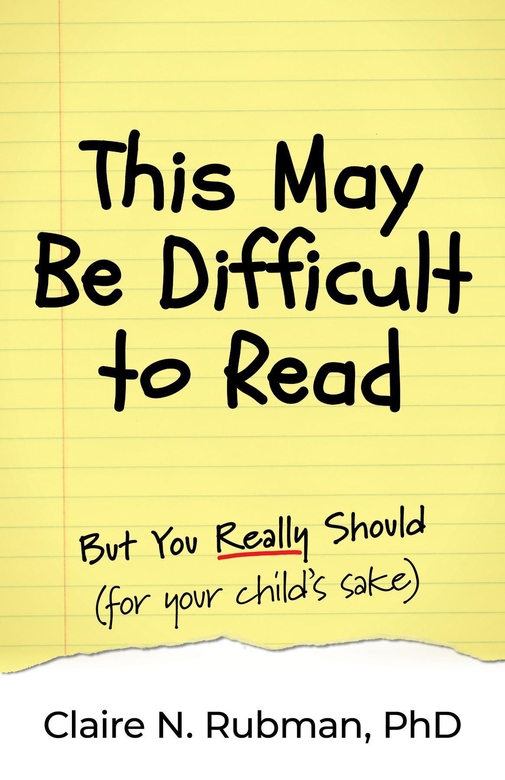
Author Claire N. Rubman, PhD presents a revolutionary new take on a fundamental facet of childhood development in This May Be Difficult to Read: But You Really Should (for your child’s sake). The shocking fact that 42 million Americans are functionally illiterate in 2023 means that this book is more critical than ever, especially for those with the responsibility to teach.
As Rubman quickly explains, learning to read and learning to comprehend are two very different things, though they are often grouped together. She astutely separates these ideas, highlighting the reasons behind the growing rift between them, and offers informed insight into how to reunite these critical skills.
Calling out some of the most destructive myths and ineffective teaching methods related to reading and literacy, Rubman is trying to undo some unwise societal programming, i.e. earlier is better, unhealthy comparisons, and arbitrary metrics for “normalcy.” She also dismantles arguments about genius babies and lays out some dense neurological info that clears up countless false assumptions about development.
Presenting anecdotal lessons from her professional practice and her own life, interspersed with wisdom from contemporary and classic sources, this is both a persuasive thesis and a friendly guidebook. Many of the approaches and strategies explored here have been proven to work previously, and this book merely connects parents with the facts, data, and customizable strategies to apply in their own homes. Rubman’s stated intention to “reinvent reading” is certainly a bold one, but the points that she carefully and logically lays out make it quite clear that there needs to be a paradigm shift in education, policy-making, and parental philosophy.
There is a major emphasis on positivity within a child’s reading process, with the ultimate goal of having your children sincerely enjoy reading, not be the “best reader.” The second half of the book, once the myths are busted, is where parents and teachers can dig into new knowledge and curricula to inspire greater reading success in young people. This is where the author’s creativity and insight shine most, aided by her comfort in dissecting educational and developmental philosophy.
Throughout, Rubman does an excellent job of maintaining the accessibility of the book, without compromising her role as an academic authority and expert in the field. The short chapters are easy to move through, each with a clear purpose and takeaway message, and the overall structure is intuitive – as there isn’t a traditional narrative, one can jump around between chapters easily.
From an editorial standpoint, some of the subtitles within the chapters feel too informal or punny, and the image choices are often simplistic or unnecessary, seeming more like ClipArt added at the last minute. This book is about children, and is intended to be explained from their perspective, but the illustrations are not quite effective for the intended audience. Aside from that issue, the prose is clean and well-edited, and while there is an overuse of exclamation points, the author’s obvious passion for this subject comes through from the start.
As a whole, This May Be Difficult to Read is a tremendously helpful read for parents, teachers, and anyone else who cares about increasing literacy in new generations, offering a necessary perspective shift on childhood education.
Book Links
STAR RATING
Design
Content
Editing
Get an Editorial Review | Get Amazon Sales & Reviews | Get Edited | Publish Your Book | Enter the SPR Book Awards | Other Marketing Services























Leave A Comment